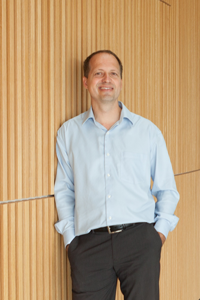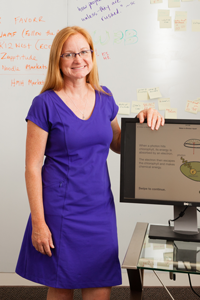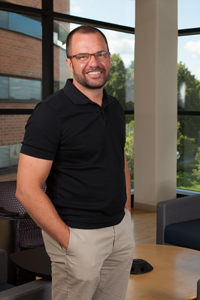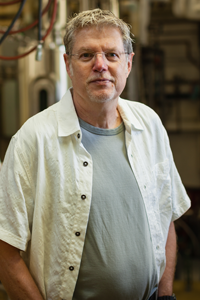
Larry Wackett never planned to get involved in translational research, but in the mid-2000s he realized that he might have a solution to a pressing problem: melamine contamination in china's milk supply. In 2008, reports began rolling in about milk and infant formula tainted with melamine, a chemical that gives the appearance of higher protein content. Hundreds of thousands of people, including many children and babies, fell ill. But without a test that could be used in the field and provide on-the-spot results, identifying the source of the melamine remained problematic.
“I realized that an enzyme we studied that breaks down melamine could be used in a quick test,” says the Distinguished McKnight University Professor. Wackett enlisted an undergraduate in his lab to work on stabilizing the enzyme, which the University then licensed to Bioo Scientific. Within six months, the company was selling the test in China.
“It was really gratifying. This thing we had studied for fundamental reasons had an important use in the end. It got me thinking.” He caught the translational bug and ended up launching his own startup focused on water bioremediation.
The particulars may vary, but Wackett’s experience points to a common motivator among many academic researchers who jump into the commercial fray — the opportunity to make a direct impact and improve lives.
“Biology underpins solutions to nearly all of our greatest challenges to the environment and human health,” says College of Biological Sciences Dean Valery Forbes. “Given the breadth and depth of the science going on in this college, it makes a lot of sense that the discoveries and new technologies developed by our faculty are catalysts for industry collaborations of all kinds.”
THE CLIMATE for such collaborations has never been better. The University of Minnesota recently celebrated a milestone: 100 startups in 10 years. And last year, the University’s Office for Technology Commercialization (OTC) finalized a major licensing deal with the University of Texas’ M.D. Anderson Cancer Center for use of the Sleeping Beauty Transposon technology developed by geneticist Perry Hackett. The center used the technology to create a first-of-its kind nonviral gene therapy treatment that targets cancer by supercharging a patient’s immune system.
Hackett is a veteran “bio-entre- preneur” who has been involved in startups and technology commercialization for decades. When pondering what to do with the funds he received as part of the deal, his first thought was to invest them in the Center for Genome Engineering, which he co-founded. This summer, the Hackett Fund for Genome Engineering was presented to the center’s current di- rector Dan Voytas, creating a mutually beneficial feedback loop between academic research and industry.
“THE FOCUS on entrepreneurship is happening at the highest level,” says Anne Hall, technology strategy manager for the life sciences in OTC. Hall points to "ecosystem changes" at federal funding agencies, which are increasingly asking researchers to think about how to translate their results for the public good.
Both the National Science Foundation and National Institutes of Health introduced new programs in recent years designed to boost entrepreneurship within the ranks of life sciences researchers. That push to turn new knowledge generated by University researchers into novel approaches to addressing a wide range of issues is driving a surge in business interest and activity.
At the same time, Hall notes growing receptivity among research- ers to commercializing their findings. “It’s exciting that even the newest faculty are very enthusiastic about industry collaboration and consider it an important aspect of their research programs.”
Meet a few of the CBS faculty engaged in commercial-academic cross-pollination.
—STEPHANIE XENOS
Setting a stumbling block for cancer

Reuben Harris has made some amazing breakthrough discoveries over the years, among them the role of APOBEC enzymes in cancer. As it turns out, a pair of APOBEC enzymes generate a “mutation signature" common across all cancers types, second only to age-related mutations.
It’s a stunning insight, but the process of turning findings into therapies falls outside of the scope of an academic research lab. So Harris decided to make a bold move and launch his own startup. His big idea? Impede the APOBEC enzymes’ ability to mutate and, consequently, slow down the “evolvability” of cancer.
Harris and colleagues launched ApoGen in 2014 to develop therapies that do just that.
While current treatments are often effective in the short term, they fail in the long run as tumors evolve and adapt to the interventions. Slowing down their progress could improve outcomes for numerous cancer patients. “It’s the right idea at the right time,” says Harris. “No one else is working on this yet. It’s a totally novel approach.”
Now in talks with investors, the company is poised to ramp up. Despite the heavy commitment required to get a business off the ground, Harris sees what he does in his dual roles as investigator and entrepreneur as complementary.
“There’s a nice synergy between the two,” he says. “You have to fully understand how something works before you can do anything about it, and that’s a huge opportunity on the academic research side of things.”
Photosynthesis isn't a game, or is it?

Ask a biology teacher about which concepts are the most difficult to teach and photosynthesis is very likely to come up. “Photosynthesis is a universally problematic topic fraught with misconceptions and loathed by teachers and students despite being hugely important,” says Sehoya Cotner. “I threaten to talk about it when my students are getting off topic."
When Twin Cities-based Andamio Games approached Cotner about lending her expertise in the development of an iPad app about cell respiration and photosynthesis for use in high school biology courses, she was undaunted despite a lack of gamer cred. She agreed to take up the challenge of translating the tricky topics for the unfamiliar medium.
Cotner sees educational gaming as a natural extension of the technology-enabled interactivity already common-place in active-learning classrooms. Moreover, the biology education expert sees some significant upsides to teaching with this particular kind of technology.
“It allows you to test what knowledge students already have and calibrate accordingly,” says Cotner. In gaming par- lance, “you can’t get to level two until you understand level one,” she explains.
She’s also a fan of the functionality. “The game includes actual labs students can do and experiments can fail, which is amazing because it allows them to make mistakes without the time investment of physical experiments.” The game also includes a group-play option so students can solve problems together.
Best of all? Students collect points they can use to grow a virtual garden based on their mastery of photosynthesis to make that perennial favorite: chips and salsa.
Next-gen agriculture in our own backyard

Dan Voytas is an old hand when it comes to startups. He launched his first biotech company years ago while still a faculty member at Iowa State University. The company didn’t take off, but the experience left its imprint on him all the same. “One thing that became evident to me — and I feel even more profoundly now,” says Voytas, “is that there’s a lot of satisfaction in seeing things move from the lab to the real world.”
Voytas is chief scientific officer of Twin Cities-based Calyxt, a biotechnology company focused on developing crops with healthier characteristics using TALENs (transcription activator-like effector nucleases), a technique developed by Voytas and a colleague to modify specific genes in a cell. Science named TALENs one of 2012's top scientific breakthroughs.
At Calyxt, Voytas is using the precision gene-editing technique to improve disease resistance in plants, and modify plant oils and carbohydrates to make them healthier and easier to process.
This time around, all signs point to success. After several years fine-tuning the technology and building capacity in other areas, including hiring a CEO and building greenhouses, Calyxt is poised to begin testing a wide range of new soybean varieties with an eye to launching its first commercial product in 2018.
Says Voytas: “It’s been remarkable to see how quickly things have developed in the genome engineering field and to be part of that.”
Clean water, there's an enzyme for that!

Pool water is a tricky business. Keeping it free of bacteria and crystal clear involves carefully maintaining a chemical cocktail that includes chlorine and cyanuric acid, which keeps chlorine from degrading under sunlight. But, over time, cyanuric acid builds up in the water and weakens chlorine’s bacteria-battling abilities The solution: drain the pool and start over, wasting an enormous amount of water in the process. With millions of residential and commercial pools in the United States alone, that adds up to billions of gallons of water a year.
“In the not-too-distant future, water will be more precious than oil. We need to do a better job of reusing it,” says Larry Wackett.
Wackett and University colleague Al Aksan launched Minnepura Technologies with an eye to doing something about the problem. The researchers developed a device to filter chemical-laden pool water using enzymes packed in a silica casing to eliminate contaminants in water. Their company, named one of the top startups of 2016 by the Nation- al Council of Entrepreneurial Tech Transfer, is testing and evaluating prototypes, and expects to launch a commercial product next year.
Starting Minnepura has delivered dividends for Wackett’s students, too. Undergraduate Chris Nguyen, who is studying biology and supply chain management, is learning about the business side of biotechnology as an intern with the company. Plus, Wackett says the experience provides useful insights he can pass on to his students.
“Because of this experience I’m able to talk not just about the nuts and bolts of the science but how it works in the real world.”